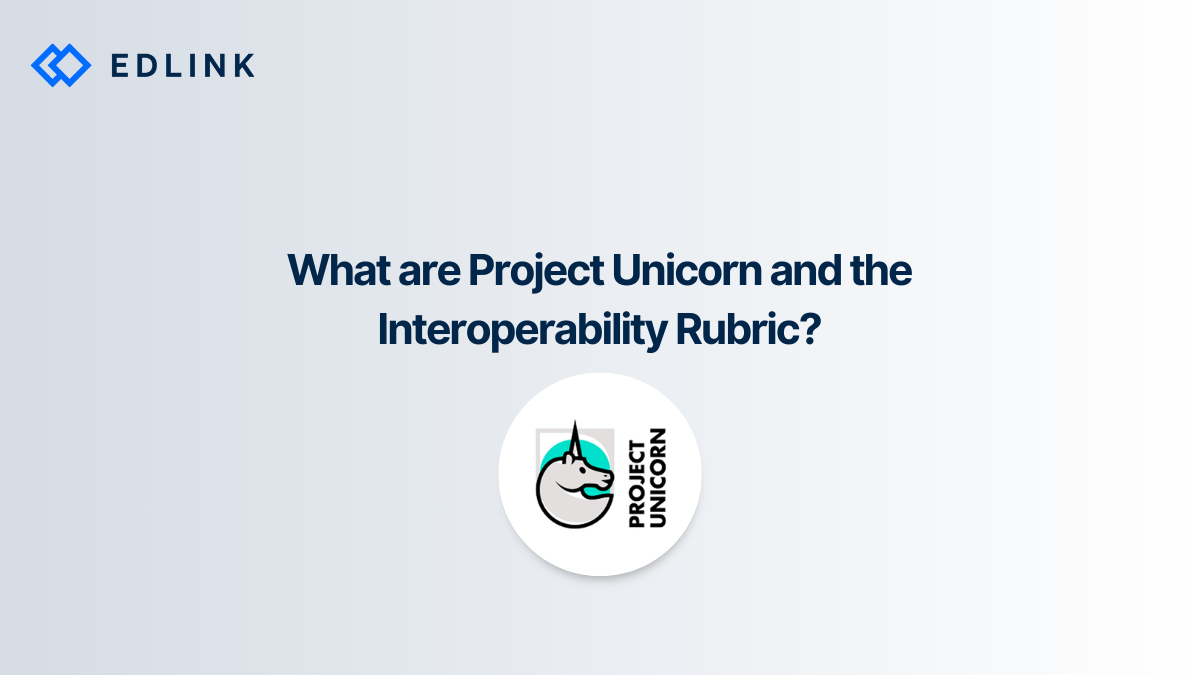Districts, state education agencies, and vendors can all join Project Unicorn by signing the Data Interoperability Pledge. The pledge for edtech vendors is a commitment to enhance the interoperability of products. Additionally, the pledge states that vendors will commit to the following:
- Ensure that products meet at least a Level 2 on the Project Unicorn Interoperability Rubric within one year;
- Commit to ultimately reaching Level 4 on the Project Unicorn Interoperability Rubric; and
- Sign the Future of Privacy Forum Student Privacy Pledge within a year.
The Interoperability Rubric
The Project Unicorn Interoperability Rubric measures how well an edtech product supports interoperability. The metrics in the rubric are graded between Levels 1 - 4, with Level 1 providing the least interoperability and Level 4 providing the most. The rubric evaluates products on the following metrics:
- Data Quality
- Data Granularity
- Export Process
- Export Security
- Export Frequency
- Export Format
- Import Process
- Import Security
- Import Frequency
- Import Format
Data Quality
Data quality refers to how students are represented in the data model. Better data quality means that students are assigned unique identifiers that are used to track the student over time. Data quality is further enhanced when the unique identifier is imported directly from a school or a record-keeping platform, such as an SIS.
Data Granularity
Highly interoperable data should be defined into hierarchical units. For example, student data could be recorded as part of a section, within a course, within a school, within a district. Defining data into multiple units better helps vendors export and import relevant data.
Export Process
An interoperable export process focuses on ensuring that data can be transmitted via standard exchange protocols. At a minimum, the export should be manually downloadable in a machine-readable format, such as a CSV file. Highly interoperable export processes will use industry standard aligned APIs to export data between products and platforms.
Export Security
To support a basic level of interoperability, exports should be encrypted to protect sensitive school data. An even more robust option would be to encrypt student data with data restrictions and additional safeguards, such as requiring a secure VPN or authentication.
Export Frequency
Exports that can be produced with a high level of frequency increase interoperability. Ideally, the export can occur in real time, as data, such as enrollments and grades, can change day-to-day or even hour-to-hour.
Export Format
Exports should be in a consistent, machine-readable file format. A better solution is to provide the export in an industry standard file format, such as OneRoster or LTI.
Import Metrics
In addition to the 4 export metrics, the Interoperability Rubric includes 4 import metrics. The import metrics are evaluated similarly to their export counterparts. Products that support interoperability should be able to import data through a standardized process and in a standard format. Additionally, interoperability is enhanced when a product can import student data frequently and securely.
Technical Descriptions and Examples
The rubric provides real-world examples and descriptions of what interoperability looks like at each level. At Level 1, student data is defined by the vendor and is extracted manually using tools specific to the product’s interface. An example of this is a teacher downloading a PDF of assessment data from a learning management system. This is a Level 1 example because the data in the PDF is not machine-readable and can only be generated through a manual request. No other tool that the teacher uses would be able to interpret the data in the file.
Conversely, a Level 4 implementation would see data exchanged in standard formats and APIs that can occur in real-time. An example of this would be a product implementing LTI assignment and grade services. Since LTI is a widely supported standard among learning management systems, the teacher will be able to instantaneously exchange data between the product and their LMS, regardless of which platform they use.
The Project Unicorn Tier Rating
When vendors sign the Data Interoperability Pledge, they receive a self-assessment form that to complete and send back to Project Unicorn. Project Unicorn then grades the assessment against the Interoperability Rubric. A member will also check if the product is actually certified to support a certain standard if the self-assessment states that it does. The product is then given a ranking between 1 and 4. Vendors may reassess their product when they make updates to enhance interoperability.
Read more about Edlink's Security and Privacy Practices
If you’re interested to learn more about Edlink’s Unified API, here’re other articles we’ve written.
- Edlink’s Security Center - Our Collection of Security Articles
- Edlink’s Privacy Center - Our Collection of Privacy Articles
- How does Edlink Handle Data Privacy and Security?
- How Edlink Handles School Data
- Does Edlink store PII?
Learn More about Edlink
If you're looking for a partner to guide you through developing integrations like these, then let us introduce ourselves. We're Edlink!

